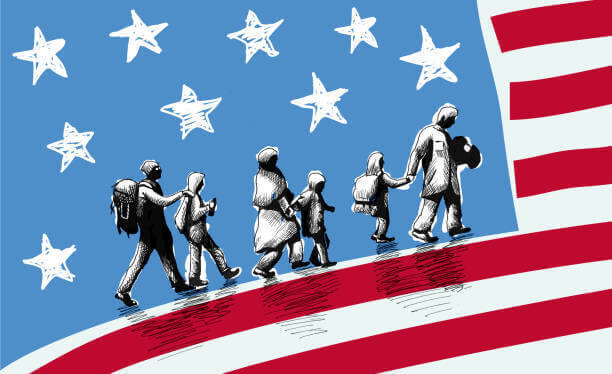Biden administration officials assured members of the Supreme Court that Title 42 will soon be null and void. With this, the ultimate end of the pandemic-era immigration measure could be in sight.
However, the Supreme Court justices are scheduled to consider the arguments on March 1. That day, it will be decided whether Republican-led states can keep the Trump administration’s immigration measure in place or whether it will be repealed.
What is Title 42?
This is the immigration removal policy introduced by the Trump administration in March 2020, implemented as a sanitary measure against COVID due to the risk of spreading the virus that the opening of borders implied.
However, in practice, it meant a justification for the anti-immigration policies of the former Trump administration under the guise of health prevention measures due to the COVID pandemic.
On the other hand, humanitarian organizations have stated that the policy prevents migrants fleeing violence and persecution from obtaining a safe harbor required by U.S. and international law. However, border officials fear their disappearance could fuel an increase in illegal crossings along the border.

The Derogation: Back and forth.
The Department of Homeland Security (DHS) had announced the end of Title 42 in December 2022. However, it was Judge Emmet G. Sullivan of the U.S. District Court in Washington who struck down the measure in November 2022. Sullivan argued that it did too little for public health and too much to endanger immigrants, setting December 21, 2022, as the deadline for ending the program.
However, a unanimous three-judge panel of the Court of Appeals for the District of Columbia Circuit denied the suspension request. It was argued that they had waited too long to try to intervene in the case presented by the migrant families to stop the expulsions due to the sanitary measure.
However, due to multiple appeals by the Republican-led states, the case reached the Supreme Court.
The Supreme Court in December blocked a lower court judge’s decision that would have lifted the measure, allowing even immigrants who might otherwise be eligible for asylum to be deported to the southern border.
This Tuesday, the Biden administration urged the Supreme Court to dismiss the challenge and end Title 42, arguing that the emergency health measures taken because of the COVID pandemic will expire on May 11 of this year.
What is the future of Title 42?
The December Supreme Court order was a tentative victory for the 19 Republican states that had sought to keep Title 42 in place. It argues that it is the states that often bear the brunt of the effects of increased border crossings.
In agreeing to hear the case, the Supreme Court made it clear that it would only address whether the states that had requested the stay could go forward with their challenge to the measure. In this regard, the administration’s brief argued that “dismissal of the underlying case would also nullify the petitioners’ attempt to intervene.”
The court was sharply divided on whether to grant the stay, which can be seen in the fact that Justices Sonia Sotomayor, Elena Kagan, Neil M. Gorsuch, and Ketanji Brown Jackson dissented.
Justice Gorsuch, in a dissent later joined by Justice Jackson, wrote that the court had effectively taken the wrong position, on a broader question underlying the case: whether the coronavirus pandemic justified the immigration policy.
Remember that the Centers for Disease Control and Prevention (CDC) had initially adopted the policy to prevent cross-border transmission of the disease. This health policy is no longer considered necessary, and will come to an end on May 11 of this year.

At Jaskot Law, we can offer assistance to those seeking to live and work in the United States legally.

